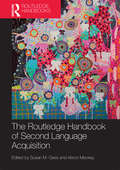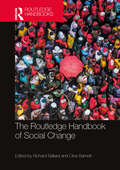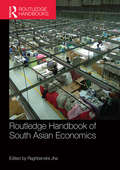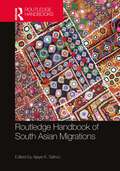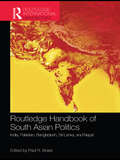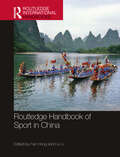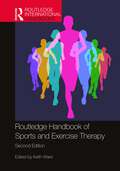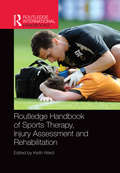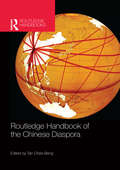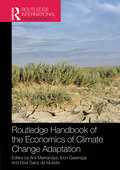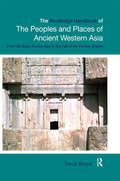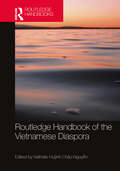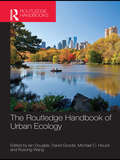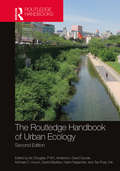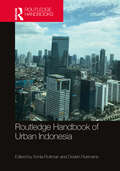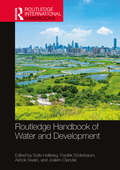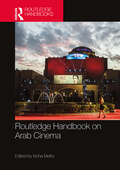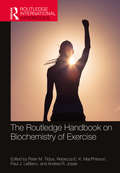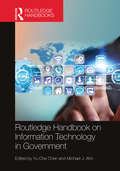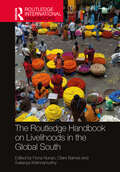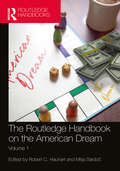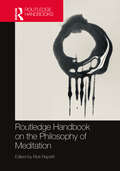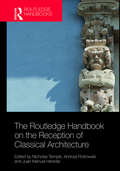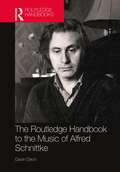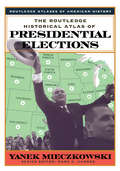- Table View
- List View
The Routledge Handbook of Second Language Acquisition (Routledge Handbooks in Applied Linguistics)
by Alison Mackey Susan M. GassThe Routledge Handbook of Second Language Acquisition brings together fifty leading international figures in the field to produce a state-of-the-art overview of Second Language Acquisition. The Handbook covers a wide range of topics related to Second Language Acquisition: language in context, linguistic, psycholinguistic, and neurolinguistic theories and perspectives, skill learning, individual differences, L2 learning settings, and language assessment. All chapters introduce the reader to the topic, outline the core issues, then explore the pedagogical application of research in the area and possible future development. The Routledge Handbook of Second Language Acquisition is an essential resource for all those studying and researching Second Language Acquisition.
The Routledge Handbook of Social Change
by Richard Ballard Clive BarnettThe Routledge Handbook of Social Change provides an interdisciplinary primer to the intellectual approaches that hold the key to understanding the complexity of social change in the twenty-first century. We live in a world of intense social transformation, economic uncertainty, cultural innovations, and political turmoil. Established understandings of issues of well-being, development, democratisation, progress, and sustainability are being rethought both in academic scholarship and through everyday practice, organisation and mobilisation. The contributors to this handbook provide state-of-the-art introductions to current thinking on central conceptual and methodological approaches to the analysis of the transformations shaping economies, polities, and societies. Topics covered include social movements, NGOs, the changing nature of the state, environmental politics, human rights, anti-globalism, pandemic emergencies, post-Brexit politics, the politics of resilience, new technologies, and the proliferation of progressive and reactionary forms of identity politics. Drawing on disciplines including anthropology, human geography, political sociology, and development studies, this is a comprehensive and authoritative introduction to researching key issues raised by the challenge of making sense of the twenty-first century futures.
Routledge Handbook of South Asian Economics
by Raghbendra JhaThe Routledge Handbook of South Asian Economics addresses the recent economic transformation in South Asia. Leading experts in the field look at the major economic achievements and challenges for the region and examine why economic development across the South Asia region has diverged so significantly since the early 1990s. Providing a cutting-edge review of the economies of South Asia, the Handbook analyzes key growth areas as well as key structural weaknesses and policy challenges facing these economies. Furthermore, it anticipates trends and suggests corrective measures for the South Asian economic region. Sections focus on issues of human development, such as inequality, poverty and quality of schooling, and monetary and fiscal issues, particularly in light of the ongoing global financial crisis. Further sections discuss issues relating to employment and infrastructure, and on the experience of the region with international trade and financial flows, and environmental challenges. Written by renowned and respected experts on South Asian economics, this Handbook will be an invaluable reference work for students and academics as well as policy makers interested in South Asian Studies, Economics and Development Studies.
Routledge Handbook of South Asian Migrations
by Ajaya K. SahooRoutledge Handbook of South Asian Migrations presents cutting-edge research on South Asian migrants written from a diverse theoretical and methodological perspective by leading scholars from around the world. This book provides a comprehensive understanding of how South Asians negotiate and promote South Asian culture both within and outside the region while undergoing several challenges during the process of migration. The Handbook covers many dimensions of South Asian migrations written by leading scholars from across the world, including but not limited to sociology, history, anthropology, economics, political science, geography, education, psychology, literature, and cultural studies. Divided thematically into five broad sections the chapters critically analyse some of the pertinent issues of South Asian migrations: • Contextualizing South Asian Migrations • Migration, Language, and Identity • Politics of Migration and Development • Gender, Culture, and Migration • Migration, Diaspora, and Transnationalism Addressing these issues from a multidisciplinary, multigenerational, multiracial, and multi-ethnic perspective, the Routledge Handbook of South Asian Migrations fills a gap in the literature and is an invaluable resource for students and scholars throughout the social sciences and humanities.
Routledge Handbook of South Asian Politics: India, Pakistan, Bangladesh, Sri Lanka, and Nepal
by Paul R. BrassThe Routledge Handbook of South Asian Politics examines key issues in politics of the five independent states of the South Asian region: India, Pakistan, Bangladesh, Sri Lanka, and Nepal. Written by experts in their respective areas, this Handbook introduces the reader to the politics of South Asia by presenting the prevailing agreements and disagreements in the literature. In the first two sections, the Handbook provides a comprehensive introduction to the modern political history of the states of the region and an overview of the independence movements in the former colonial states. The other sections focus on the political changes that have occurred in the postcolonial states since independence, as well as the successive political changes in Nepal during the same period, and the structure and functioning of the main governmental and non-governmental institutions, including the structure of the state itself (unitary or federal), political parties, the judiciary, and the military. Further, the contributors explore several aspects of the political process and political and economic change, especially issues of pluralism and national integration, political economy, corruption and criminalization of politics, radical and violent political movements, and the international politics of the region as a whole. This unique reference work provides a comprehensive survey of the state of the field and is an invaluable resource for students and academics interested in South Asian Studies, South Asian Politics, Comparative Politics and International Relations.
Routledge Handbook of Sport in China (Routledge International Handbooks)
by Fan Hong Liu LiThis is the first book to offer a comprehensive overview of the history and development of sport from the ancient to the contemporary era in China. It addresses the gap between the vibrant academic scholarship within China and the limited understanding of Chinese sport outside of the country. It opens different perspectives on Chinese sport and addresses a wide range of issues central to the development of sport in the context of Chinese culture, politics, economy, and society. It explores a diverse set of topics including the history of Chinese traditional sport, the rise of modern sport and the Olympic movement, sport and nationhood, sport and politics and international relations, sport and physical education, sport and economy and commerce, sport and social stratification and diversity, and sport leisure and tourism. It offers critical insights into the multifaceted world of China, past and present—a contribution to our collective knowledge and understanding of Chinese sport and society—and is useful reading for students, researchers, and professionals with an interest in the field of China and Chinese sport. This Handbook has been contributed to by a team consisting of 88 leading Chinese and Asian experts and scholars with varied backgrounds of studying and working in European, North American, and Australian universities, as well as Western scholars with expertise on China and its sports system and practice. It is composed of ten parts classified by different subjects. It provides a wide lens through which to better contextualise the relationships between China and the world within the global sport community. The Routledge Handbook of Sport in China is a vital resource for students and scholars studying the history, politics, sociology, culture and policy of sport in China, as well as sport management, sport history, sport sociology, and sport policy and politics. It is also valuable reading for those who are working in international sport policy making and sport organisations.
Routledge Handbook of Sports and Exercise Therapy (Routledge International Handbooks)
by Keith WardThe Routledge Handbook of Sports and Exercise Therapy is a methodically detailed, authoritative, contemporaneous and practical reference source for all those involved in sports and exercise therapy, whether students, established practitioners, educators or researchers. This comprehensive handbook cohesively presents foundational subjects and introduces principles and applications to support the development and practice of sports and exercise therapists.These are presented alongside new essential and evolving topic areas. Such a blend of fundamental underpinning and applied and experiential practical guidance gives this handbook a real sense of relevancy, and a contribution which can help to consolidate the positioning of sports and exercise therapists as key practitioners in an advancing landscape of health, exercise, sport, research and education. The handbook has been produced to create a seamless reference source for readers, but each of its chapters are also designed to be stand-alone presentations in their own right. The following areas are covered: Learning and teaching Evidence-based practice Anatomy and physiology Pathology of injuries Health and safety Clinical assessment Therapeutic modalities Injury rehabilitation Sports and exercise as medicine Sports and exercise nutrition Sports and exercise psychology Professionalism and ethics Structural and cultural competency Sideline sports injury management Management of regional injury conditions Case studies in sports and exercise therapy Employability and career development The handbook is comprehensively referenced and multi-authored. Its design incorporates numerous photographs, figures, tables and detailed sample document templates. It can be considered as an essential and topical resource for anyone involved in sports and exercise therapy, whether in their first year as an undergraduate or already working in professional practice.
Routledge Handbook of Sports Therapy, Injury Assessment and Rehabilitation (Routledge International Handbooks)
by Keith WardThe work of a sports therapist is highly technical and requires a confident, responsible and professional approach. The Routledge Handbook of Sports Therapy, Injury Assessment and Rehabilitation is a comprehensive and authoritative reference for those studying or working in this field and is the first book to comprehensively cover all of the following areas: Sports Injury Aetiology Soft Tissue Injury Healing Clinical Assessment in Sports Therapy Clinical Interventions in Sports Therapy Spinal and Peripheral Anatomy, Injury Assessment and Management Pitch-side Trauma Care Professionalism and Ethics in Sports Therapy The Handbook presents principles which form the foundation of the profession and incorporates a set of spinal and peripheral regional chapters which detail functional anatomy, the injuries common to those regions, and evidence-based assessment and management approaches. Its design incorporates numerous photographs, figures, tables, practitioner tips and detailed sample Patient Record Forms. This book is comprehensively referenced and multi-authored, and is essential to anyone involved in sports therapy, from their first year as an undergraduate, to those currently in professional practice.
Routledge Handbook of the Chinese Diaspora
by Tan Chee-BengWith around 40 million people worldwide, the ethnic Chinese and the Chinese in diaspora form the largest diaspora in the world. The economic reform of China which began in the late 1970s marked a huge phase of migration from China, and the new migrants, many of whom were well educated, have had a major impact on the local societies and on China. This is the first interdisciplinary Handbook to examine the Chinese diaspora, and provides a comprehensive analysis of the processes and effects of Chinese migration under the headings of: Population and distribution Mainland China and Taiwan’s policies on the Chinese overseas Migration: past and present Economic and political involvement Localization, transnational networks and identity Education, literature and media The Routledge Handbook of the Chinese Diaspora brings together a significant number of specialists from a number of diverse disciplines and covers the major areas of the study of Chinese overseas. This Handbook is therefore an important and valuable reference work for students, scholars and policy makers worldwide who wish to understand the global phenomena of Chinese migration, transnational connections and their cultural and identity transformation.
Routledge Handbook of the Economics of Climate Change Adaptation: Routledge Handbook Of The Economics Of Climate Change Adaptation (Routledge International Handbooks)
by Anil Markandya Ibon Galarraga Elisa Sainz de MurietaClimate change is one of the greatest challenges facing human kind owing to the great uncertainty regarding future impacts, which affect all regions and many ecosystems. Many publications deal with economic issues relating to mitigation policies, but the economics of adaptation to climate change has received comparatively little attention. However, this area is is critical and a central pillar of any adaptation strategy or plan and is the economic dimension, which therefore merits the increase in attention it is receiving. This book deals with the difficulties that face the economics of adaptation. Critical issues include: uncertainty; baselines; reversibility, flexibility and adaptive management; distributional impacts; discount rates and time horizons; mixing monetary and non-monetary evaluations and limits to the use of cost-benefit analysis; economy-wide impacts and cross-sectoral linkages. All of these are addressed in the book from the perspective of economics of adaptation. Other dimensions of adaptation are also included, such as the role of low- and middle-income countries, technology and the impacts of extreme events. This timely book will prove essential reading for international researchers and policy makers in the fields of natural resources, environmental economics and climate change.
The Routledge Handbook of the Peoples and Places of Ancient Western Asia: The Near East from the Early Bronze Age to the fall of the Persian Empire
by Trevor BryceThis 500,000 word reference work provides the most comprehensive general treatment available of the peoples and places of the regions commonly referred to as the ancient Near and Middle East – extending from the Aegean coast of Turkey in the west to the Indus river in the east. It contains some 1,500 entries on the kingdoms, countries, cities, and population groups of Anatolia, Cyprus, Syria-Palestine, Mesopotamia, and Iran and parts of Central Asia, from the Early Bronze Age to the end of the Persian empire. Five distinguished international scholars have collaborated with the author on the project. Detailed accounts are provided of the Near/Middle Eastern peoples and places known to us from historical records. Each of these entries includes specific references to translated passages from the relevant ancient texts. Numerous entries on archaeological sites contain accounts of their history of excavation, as well as more detailed descriptions of their chief features and their significance within the commercial, cultural, and political contexts of the regions to which they belonged. The book contains a range of illustrations, including twenty maps. It serves as a major, indeed a unique, reference source for students as well as established scholars, both of the ancient Near Eastern as well as the Classical civilizations. It also appeals to more general readers wishing to pursue in depth their interests in these civilizations. There is nothing comparable to it on the market today.
Routledge Handbook of the Vietnamese Diaspora
by Nathalie Huỳnh Châu NguyễnThe Routledge Handbook of the Vietnamese Diaspora presents a comprehensive overview and analysis of Vietnamese migrations and diasporas, including the post-1975 diaspora, one of the most significant and highly visible diasporas of the late twentieth century.This handbook delves into the processes of Vietnamese migration and highlights the variety of Vietnamese diasporic journeys, trajectories and communities as well as the richness and depth of Vietnamese diasporic literary and cultural production. The contributions across the fields of history, anthropology, sociology, literary studies, film studies and cultural studies point to the diversity of approaches relating to scholarship on Vietnamese diasporas.The handbook is structured in five parts: Colonial legacies Refugees, histories and communities Migrant workers, international students and mobilities Literary and cultural production Diasporas and negotiations Offering multiple cutting-edge interpretations, representations and reconstructions of diaspora and the diasporic experience, this first reference work of the Vietnamese diaspora will be an invaluable tool for students and researchers in the fields of Asian Studies, Asian American Studies, Ethnic Studies, Refugee Studies, Transnational Studies and Migration and Diaspora Studies.
The Routledge Handbook of Urban Ecology
by Ian DouglasThe birds, animals, insects, trees and plants encountered by the majority of the world’s people are those that survive in, adapt to, or are introduced to, urban areas. Some of these organisms give great pleasure; others invade, colonise and occupy neglected and hidden areas such as derelict land and sewers. Urban areas have a high biodiversity and nature within cities provides many ecosystem services including cooling the urban area, reducing urban flood risk, filtering pollutants, supplying food, and providing accessible recreation. Yet, protecting urban nature faces competition from other urban land uses. The Handbook of Urban Ecology analyses this biodiversity and complexity and provides the science to guide policy and management to make cities more attractive, more enjoyable, and better for our own health and that of the planet. This Handbook contains 50 interdisciplinary contributions from leading academics and practitioners from across the world to provide an in-depth coverage of the main elements of practical urban ecology. It is divided into six parts, dealing with the philosophies, concepts and history of urban ecology; followed by consideration of the biophysical character of the urban environment and the diverse habitats found within it. It then examines human relationships with urban nature, the health, economic and environmental benefits of urban ecology before discussing the methods used in urban ecology and ways of putting the science into practice. The Handbook offers a state-of the art guide to the science, practice and value of urban ecology. The engaging contributions provide students and practitioners with the wealth of interdisciplinary information needed to manage the biota and green landscapes in urban areas.
The Routledge Handbook of Urban Ecology
by Douglas, Ian / Anderson, P M L / Goode, David / Houck, Michael C. / Maddox, David / Nagendra, Harini / Yok, Tan PuayThis second edition covers recent developments around the world with contributors from 33 different countries. It widens the handbook’s scope by including ecological design; consideration of cultural dimensions of the use and conservation of urban nature; the roles of government and civil society; and the continuing issues of equity and fairness in access to urban greenspaces. New features include an emphasis on the biophilic design of homes and workplaces, demonstrating the value of nature, in order to counter the still prevalent attitude among many developers that nature is a constraint rather than a value. The volume explores great practical achievements that have occurred since the first edition, with many governments increasingly recognizing and legislating on urban nature and green infrastructure matters, since cities play a major role in adapting to change, particularly to climate crisis. New topics such as the ecological role of light at night and human microbiota in the urban ecosystem are introduced. Additional attention is given to food production in cities, particularly the multiple roles of urban agriculture and household gardens in different contexts from wealthy communities to the poorest informal settlements in deprived communities. The emphasis is on demonstrating what can be achieved, and what is already being done. The book aims to help scholars and graduate students by providing an invaluable and up-to-date guide to current urban ecological thinking across the range of disciplines, such as geography, ecology, environmental science/studies, planning, and urban studies, that converge in the study of towns and cities and urban design and living. It will also assist practitioners and civil society members in discovering the ways diff erent specialists and thinkers approach urban nature.
Routledge Handbook of Urban Indonesia
by Deden Rukmana Sonia RoitmanThis handbook focuses on the practices, initiatives, and innovations of urban planning in response to the rapid urbanisation in Indonesian cities. The book provides rigorous evidence of planning Indonesian cities of different sizes. Indonesia, the world’s fourth most populous country, is increasingly urbanising. Through the lens of the Sustainable Development Goals, chapters examine specific policies and projects and analyse 19 cities, ranging from a megacity of over ten million residents to metropolitan cities, large cities, medium cities, and small cities in Indonesia. The handbook provides a diverse view of urban conditions in the country. Discussing current trends and challenges in urban planning and development in Indonesia, it covers a wide range of topics organised into five main themes: Indonesian planning context; informality, insurgency, and social inclusion; design, spatial, and economic practices; creative and innovative practices; and urban sustainability and resilience. Written by 64 established and emerging scholars from Indonesia and overseas, this handbook is an invaluable resource to academics working on Urban Studies, Development Studies, Asian and Southeast Studies as well as to policy-makers in Indonesia and in other cities of the Global South.
Routledge Handbook of Water and Development (Routledge International Handbooks)
by Sofie Hellberg Fredrik Söderbaum Ashok Swain Joakim ÖjendalWater is essential for human life and at the centre of political, economic, and socio-cultural development. This Routledge Handbook of Water and Development offers a systematic, wide-ranging, and state-of-the-art guide to the diverse links between water and development across the globe. It is organized into four parts: Part I explores the most significant theories and approaches to the relationship between water and development. Part II consists of carefully selected in-depth case studies, revealing how water utilization and management are deeply intertwined with historical development paths and economic and socio-cultural structures. Part III analyses the role of governance in the management of water and development. Part IV covers the most urgent themes and issues pertaining to water and development in the contemporary world, ranging from climate change and water stress to agriculture and migration. The 32 chapters by leading experts are meant to stimulate researchers and students in a wide range of disciplines in the social and natural sciences, including Geography, Environmental Studies, Development Studies, and Political Science. The Handbook will also be of great value to policymakers and practitioners.
Routledge Handbook on Arab Cinema
by Noha MellorBuilding on a growing body of literature, this Handbook provides an up-to-date and authoritative survey of Arab cinema.The collection includes contributions from academics and filmmakers from across the Arab region, Europe, and North America, and fills a gap in media studies by examining the entire Arab region, rather than focusing on one country or theme. The Handbook also sheds light on the heterogeneity of Arab filmmaking not only within the Arab region, but also globally, within diasporic communities. It is split into six parts: Part 1 provides an overview of each sub-region in the Arab world, including a chapter on Arab animation films. Parts 2, 3, and 4 address topical themes, encompassing the representation of gender, religion, and identity politics in Arab cinema. Part 5 discusses the theme of diaspora and Part 6 concludes the volume with reflective essays penned by selected diasporic filmmakers. This book is an essential reference for Arab media and cinema scholars, students, and professional filmmakers. With case studies from across the Arab region, it's also a valuable resource for anyone interested in film and media, global cinema, and the Middle East generally.
The Routledge Handbook on Biochemistry of Exercise (Routledge International Handbooks)
by Peter M. Tiidus Rebecca E. K. MacPherson Paul J. LeBlanc Andrea R. JosseFrom its early beginnings in the 1960s, the academic field of biochemistry of exercise has expanded beyond examining and describing metabolic responses to exercise and adaptations to training to include a wide understanding of molecular biology, cell signalling, interorgan communication, stem cell physiology, and a host of other cellular and biochemical mechanisms regulating acute responses and chronic adaptations related to exercise performance, human health/disease, nutrition, and cellular functioning. The Routledge Handbook on Biochemistry of Exercise is the first book to pull together the full depth and breadth of this subject and to update a rapidly expanding field of study with current issues and controversies and a look forward to future research directions. Bringing together many experts and leading scientists, the book emphasizes the current understanding of the underlying metabolic, cellular, genetic, and cell signalling mechanisms associated with physical activity, exercise, training, and athletic performance as they relate to, interact with, and regulate cellular and muscular adaptations and consequent effects on human health/disease, nutrition and weight control, and human performance. With more emphasis than ever on the need to be physically active and the role that being active plays in our overall health from a whole-body level down to the cell, this book makes an important contribution for scholars, medical practitioners, nutritionists, and coaches/trainers working in research and with a wide range of clients. This text is important reading for all students, scholars, and others with an interest in health, nutrition, and exercise/training in general.
Routledge Handbook on Information Technology in Government
by Yu-Che Chen Michael J. AhnThe explosive growth in information technology has ushered in unparalleled new opportunities for advancing public service. Featuring 24 chapters from foremost experts in the field of digital government, this Handbook provides an authoritative survey of key emerging technologies, their current state of development and use in government, and insightful discussions on how they are reshaping and influencing the future of public administration. This Handbook explores: Key emerging technologies (i.e., big data, social media, Internet of Things (IOT), GIS, smart phones & mobile technologies) and their impacts on public administration The impacts of the new technologies on the relationships between citizens and their governments with the focus on collaborative governance Key theories of IT innovations in government on the interplay between technological innovations and public administration The relationship between technology and democratic accountability and the various ways of harnessing the new technologies to advance public value Key strategies and conditions for fostering success in leveraging technological innovations for public service This Handbook will prove to be an invaluable guide and resource for students, scholars and practitioners interested in this growing field of technological innovations in government.
The Routledge Handbook on Livelihoods in the Global South (Routledge International Handbooks)
by Fiona Nunan Clare Barnes Sukanya KrishnamurthyThe Routledge Handbook on Livelihoods in the Global South presents a unique, timely, comprehensive overview of livelihoods in low- and middle-income countries. Since their widespread adoption in the 1990s, livelihoods perspectives, frameworks and methods have influenced diverse areas of research, policy and practice. The concept of livelihoods reflects the complexity of strategies and practices used by individuals, households and communities to meet their needs and live their lives. The Handbook brings together insights and critical analysis from diverse approaches and experiences, learning from research and practice over the last 30 years. The Handbook comprises an introductory section on key concepts and frameworks, followed by five parts, on researching livelihoods, negotiating livelihoods, generating livelihoods, enabling livelihoods and contextualising livelihoods. The introduction provides readers with an appreciation of concepts researched and applied in the five parts, including chapters on vulnerability and resilience, social capital and networks, and institutions. Each part reflects the diversity of approaches taken to understanding livelihoods, whilst recognising commonalities, including the centrality of power in shaping, enabling and constraining livelihoods. The book also reflects diversity of context, including conflict, climate change and religion, as well as in generating livelihoods, through agriculture, small-scale mining and pastoralism. The aim of each chapter is to provide a critically informed introduction and overview of key concepts, issues and debates of relevance to the topic, with each chapter concluding with suggestions for further reading. It will be an essential resource to students, researchers and practitioners of international development and related fields. Researchers and practitioners will also benefit from the book's diverse disciplinary contributions and by the wide and contemporary coverage.
The Routledge Handbook on the American Dream: Volume 1
by Robert C. Hauhart; Mitja SardočWhat do we mean by the American dream? Can we define it? Or does any discussion of the phrase end inconclusively, the solid turned liquid—like ice melting? Do we know whether the American dream motivates and inspires or, alternately, obscures and deceives? The Routledge Handbook on the American Dream offers distinctive, authoritative, original essays by well-known scholars that address the social, economic, historical, philosophic, legal, and cultural dimensions of the American dream for the twenty-first century. The American dream, first discussed and defined in print by James Truslow Adams’s The Epic of America (1931), has become nearly synonymous with being American. Adams’s definition, although known to scholars, is often lost in our ubiquitous use of the term. When used today, the iconic phrase seems to encapsulate every fashion, fad, trend, association, or image the user identifies with the United States or American life. The American dream’s ubiquity, though, argues eloquently for a deeper understanding of its heritage, its implications, and its impact—to be found in this first research handbook ever published on the topic.
Routledge Handbook on the Philosophy of Meditation
by Rick RepettiThis Handbook provides a comprehensive overview and analysis of the state of the field of the philosophy of meditation and engages primarily in the philosophical assessment of the merits of meditation practices. This Handbook unites novel and original scholarship from 28 leading Asian and Western philosophers, scientists, theologians, and other scholars on the philosophical assessment of meditation. It critically assesses the conceptual and empirical validity of meditation, its philosophical implications, its legitimacy as a phenomenological research tool, its potential value as an aid to neuroscience research, its many practical benefits, and, among other considerations, its possibly misleading interpretations, applications, and consequences. Following the introduction by the editor, the Handbook’s chapters are organized in six parts: • Meditation and philosophy • Meditation and epistemology • Meditation and metaphysics • Meditation and values • Meditation and phenomenology • Meditation in Greco-Roman and Judeo-Christian traditions A distinctive, timely, and invaluable reference work, it marks the emergence of a new discipline therein, the philosophy of meditation. The book will be of interest to an interdisciplinary audience in the fields of philosophy, meditation, Buddhism, Hinduism, Taoism, theology, and Asian and Western philosophy. It will serve as the textbook in any philosophy course on meditation, and as secondary reading in courses in philosophy of mind, consciousness, selfhood/personhood, metaphysics, or phenomenology, thereby helping to restore philosophy as a way of life.
The Routledge Handbook on the Reception of Classical Architecture
by Nicholas Temple Andrzej Piotrowski Juan Manuel HerediaThis is the first comprehensive study of the reception of classical architecture in different regions of the world. Exploring the impact of colonialism, trade, slavery, religious missions, political ideology and intellectual/artistic exchange, the authors demonstrate how classical principles and ideas were disseminated and received across the globe. By addressing a number of contentious or unresolved issues highlighted in some historical surveys of architecture, the chapters presented in this volume question long-held assumptions about the notion of a universally accepted ‘classical tradition’ and its broadly Euro-centric perspective. Featuring thirty-two chapters written by international scholars from China, Europe, Turkey, North America, Mexico, Australia and New Zealand, the book is divided into four sections: 1) Transmission and re-conceptualisation of classical architecture; 2) Classical influence through colonialism, political ideology and religious conversion; 3) Historiographical surveys of geographical regions; and 4) Visual and textual discourses. This fourfold arrangement of chapters provides a coherent structure to accommodate different perspectives of classical reception across the world, and their geographical, ethnographic, ideological, symbolic, social and cultural contexts. Essays cover a wide geography and include studies in Italy, France, England, Scotland, the Nordic countries, Greece, Austria, Portugal, Romania, Germany, Poland, India, Singapore, China, the USA, Mexico, Brazil, New Zealand and Australia. Other essays in the volume focus on thematic issues or topics pertaining to classical architecture, such as ornament, spolia, humanism, nature, moderation, decorum, heresy and taste. An essential reference guide, The Routledge Handbook on the Reception of Classical Architecture makes a major contribution to the study of architectural history in a new global context.
The Routledge Handbook to the Music of Alfred Schnittke (Routledge Russian and East European Music and Culture)
by Gavin DixonThe Routledge Handbook to the Music of Alfred Schnittke is a comprehensive study of the work of one of the most important Russian composers of the late 20th century. Each piece is discussed in detail, with particular attention to the composer’s groundbreaking polystylism, as well as his unique approach to musical symbolism and his deep engagement with Christian themes. This is the first publication to look at Schnittke’s output in its entirety, and for most works it represents either the first ever published analysis or the first in a language other than Russian. The volume presents new research from the Ivashkin-Schnittke Archive at Goldsmiths, University of London and the collection of Schnittke’s compositional sketches at the Julliard Library in New York. It also draws on the substantial research on Schnittke’s music published in the Russian language. Including a work list and bibliography of primary and secondary sources, this is an essential reference for all those interested in Russian music, 20th-century music and performance studies.
The Routledge Historical Atlas of Presidential Elections (Routledge Atlases of American History)
by Yanek MieczkowskiFirst Published in 2001. Routledge is an imprint of Taylor & Francis, an informa company.
